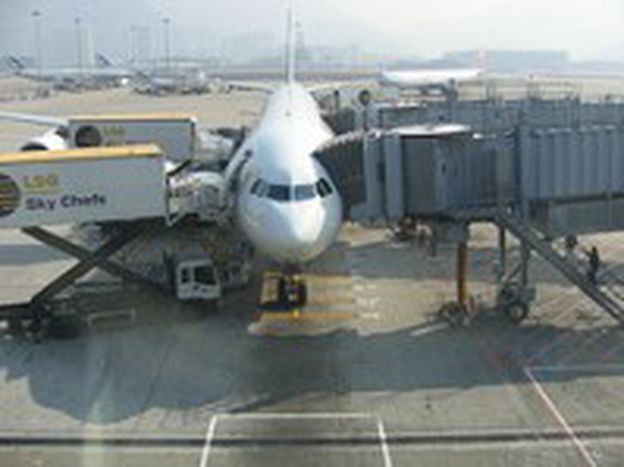
CIA flights: people, prisons and parliament
Published on
Translation by:
Nabeelah ShabbirFrom secret CIA flights to the transfer of personal data - the European parliament can’t hide its limited influence as security watchdog
Since 1988, the European Parliament has been rewarding human rights defenders with an annual official prize. In 2006, Alexandre Milinkevich, Belarus’s opposition leader, turned down the EU's Sakharov Prize, a cash sum worth 50,000 euros. Perhaps parliament should also be a future candidate for the prize.
It was the 46-nation Council of Europe who exposed the CIA’s involvement in kidnapping prisoners and torturing them – and key European countries, including Poland, who had colluded in this abuse. The European parliament got straight onto the investigation tracks and set up the Temporary Committee on alleged CIA flights and detention centres in Europe to find out the truth.
In the informal report on November 28, Giovanni Claudio Fava, committee rapporteur, condemned at least 11 member states who helped co-ordinate US activites on their terriroties. For the angered MEPs, the aim of this investigation was above all to remember that the fight against terrorism should at its base respect human rights.
 It was in this context that in July 2006, parliament decided to publish their existing investigative programmes regarding those financial movements related to terrorism in Europe. Violating EU privacy laws, SWIFT, a Belgian money transfer society, had allowed the American government access to a set of their bank transactions.
It was in this context that in July 2006, parliament decided to publish their existing investigative programmes regarding those financial movements related to terrorism in Europe. Violating EU privacy laws, SWIFT, a Belgian money transfer society, had allowed the American government access to a set of their bank transactions.
The hearings of Francis Vanbever, SWIFT chief financial officer, and of Jean Claude Trichet, president of the Central Bank of Europe, presented the evident insufficiency of European data protection laws. In the face of these failures, the commission should introduce stronger laws respecting private life.
Tied up
Parliament also reminded member states that the anti-terrorism fight could only be won with this strict respect for human rights and individual freedoms. But not all of parliament’s initiatives are effective. The more aggressive parliament’s offensives are, the less often it will stumble.
This is what happened on October 6, when the EU-25 and the US secretly signed an agreement legalising transfers, after the US legalised CIA prisons. Air companies handed over a list of personal data files. Addresses, telephone numbers, credit card details, dietary habits and the itineries of all passengers were immediately visible for the American authorities.
One of the earliest transatlantic co-operations had been organised on the sly in 2004. Considering that it concerned a flagrant violation of the relative norms to data protection, parliament’s appeal to the tribunal of justice in Europe saw the agreement annulled in May 2006.
Futile crown
But this victory was in fact a severe failure in the defence of fundamental European rights. The 25 had taken sufficient care to conclude a new agreement about a legal base which, this time, weakening all parliamentary control, and thereby depriving the European citizens of their principal defender.
Does the same apply to the CIA flights investigation? The credibility of parliament is at stake. The conclusions of the committee report aren’t secret, but it is clear that parliamentary investigative delegations have been extremely badly received by a good number of countries.
Zbigniew Siemiatkowski, the former head of Poland's intelligence service, agreed to meet with Fava, but stated that the appointment was ‘ridiculous and pointless’. Whilst parliament roundly condemned the US, urging EU members to come clean, the former looked to discredit the investigation. ‘The report is based on presumptions and not on actual tests’, is something they haven’t ceased to declare in their defence.
To avoid that the wings of the principal defender of human rights aren’t further singed by futility, it is time for parliament to make themselves powerful on the clampdown of security abuses and internal affairs.
Abu Omar - story of an (illegal) abduction
The European Parliament has made a clear accusation against the CIA for the abduction of Abu Omar, Egyptian Imam, in 2003, and has called into question the non-involvement of the Italian authorities.
On February 17 2003 in Milan, Hassan Mustafa Osama Nasr/ Abu Omar - resident in Italy since 2001 - mysteriously disappeared in broad daylight whilst on his way to the mosque.
 On October 9 this year, magistrate Armando Sparato explained his theory in front of the Temporary Committee on alleged CIA flights and detention centres in Europe.
On October 9 this year, magistrate Armando Sparato explained his theory in front of the Temporary Committee on alleged CIA flights and detention centres in Europe.
The story goes...
Abu Omar was seized as part of a joint operation between SISMI (Italian Military Intelligence and Security Service) and the CIA. He was then transferred to Egypt on a secret flight via Aviano and Ramstein in Germany, where he was imprisoned and tortured. To confirm this, a testimonial from Abu Omar, currently imprisoned in Egypt, arrived on November 22. But what role was played by the Italian Government - led at the time by the notorious Silvio Berlusconi?
Spatarato told the European Parliament that the level of involvement of Nicolò Pollari, the then director of SISMI, 'is one of the highest found. At the moment there are no ‘tests’ of involvement from the Italian Government. But it is difficult to think that there was absolutely no complicity.'
Preliminaries
After years of investigations, the preliminary hearing in Milan has been fixed for January 9. There are 35 defendants including Pollari, other agents of the secrets intelligence agency, the 'ROS' marshal (special undercover division of the Italian police), and 26 CIA agents. Silvio Berlusconi has hurried to express his 'full solidarity to General Nicolò Pollari, a faithful servant of the State that deserves the acknowledgment of all those who have the security of the country at heart.'
But Abu Omar’s case is different from all the other abductions that the CIA is accused of. It highlights the need for proof of involvement by a member state. This is what the European Parliament Commission has condemned in its meeting on November 24, on Abu Omar's abduction of 'on the part of the CIA'. It has deplored the fact that the 'representatives of the current and previous Italian government have refused to take part in the proceedings.' It is possible that they will be forced to make an appearance soon at an Italian court.
Written by Daniele Calisti
Translated by Sarah Turpin
Translated from Vols secrets de la CIA : un Parlement limité



